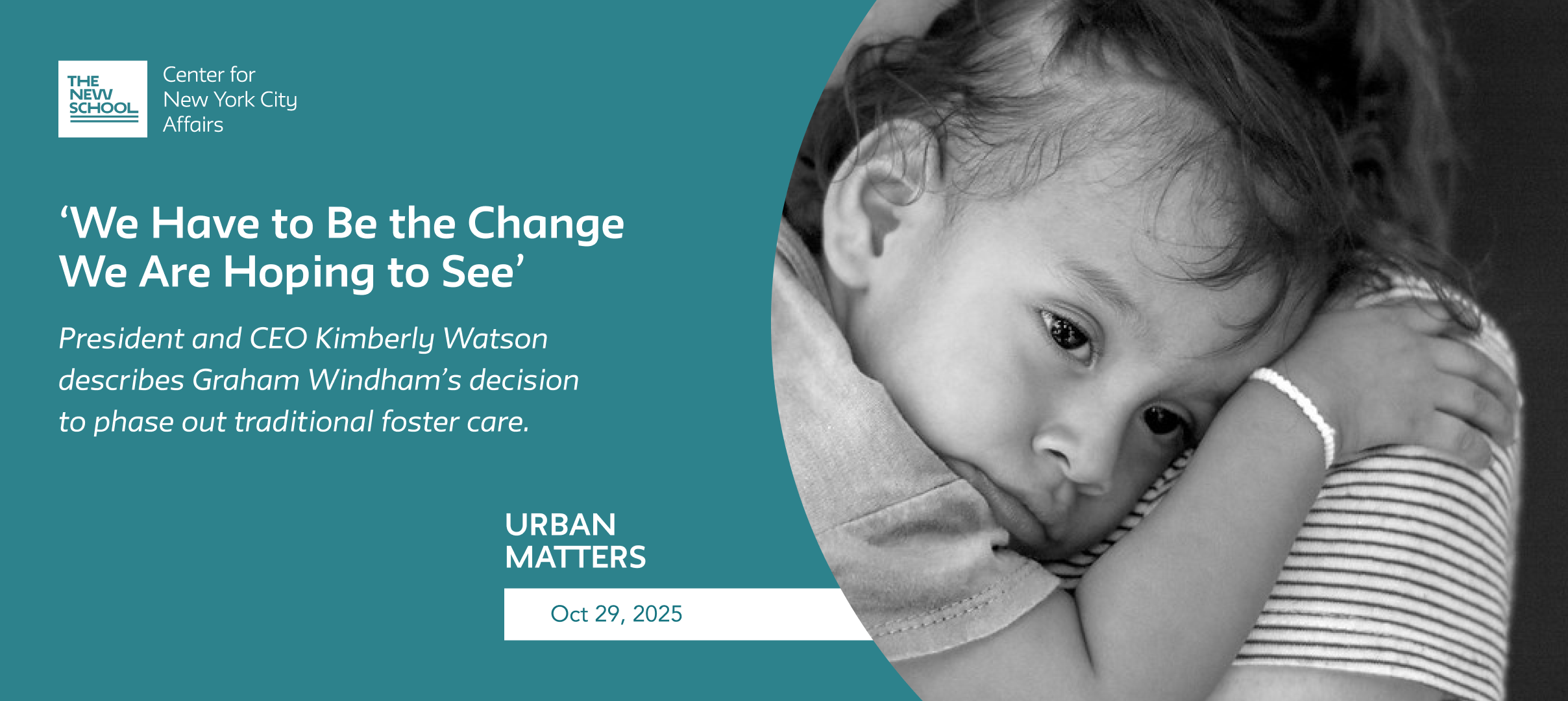‘We Have to Be the Change We Are Hoping to See’
Urban Matters: Kym, in recent months, Graham Windham – a major player in the world of child welfare – has announced that as part of a reappraisal of its role in “the family regulation system,” it’s committed to finding alternatives to foster care.
You’ll have more to say about that at a “community conversation” you and others active in child welfare (New York Foundling, Good Shepherd Services, and the Redlich Horwitz Foundation) are convening along with the Narrowing the Front Door Work Group at The New School next week. But in a nutshell, what does Graham have it mind? Will it mean curtailing or phasing out your role in foster care placements, and, if so, how do you envision that happening?
Kimberly Watson: In November 2024, Graham updated our mission statement, which defines our commitment to provide life-changing tools and resources to children, families, and communities impacted by poverty, injustices, and lack of access to the elements they need to have healthy, joyful, and successful lives. (We also updated our brand, logo, and website.) And we’ve developed a “Strategic Vision 2029” that centers our work over the next four years around four overarching goals:
Develop alternatives to foster care that eliminate harm;
In partnership with communities, provide support for family wellbeing;
Help youth and parents lead healthy, prosperous lives; and
Further advance a thriving ‘one Graham’ culture.
Under the first goal, Graham endeavors to develop and implement models of support to families outside of ACS separation when parental circumstances or unsafe situations necessitate children being in temporary out-of-home care. [ACS, or the Administration for Children's Services, is the city government's child protective agency.] Graham is looking at models that keep the original and host families connected and deciding together how to care for the child or children. We will be phasing out our ACS foster care programs to give way to robust community-based family support and compassionate alternative temporary out-of-home care, as a last resort.
UM: You’ve called this redirection the product of an ongoing institutional reckoning concerning the significant part Graham has played in child welfare in New York City for many generations. What has prompted this reexamination, and what kind of soul-searching and dialogue has this involved?
Watson: Graham is committed to continuous organizational development and self-improvement. What we require of ourselves individually is also true corporately. After participating in learning opportunities with progressive human services practitioners, advocates, abolitionists, and attorneys, and hearing the personal stories of families and our employees, there was no way we could pretend all is well and that a few tweaks will fix the problems of the system. And we know that the child welfare system is not the only problematic element. Education, health care, and housing bureaucracies can impede family progress too.
UM: How will this change play out for Graham’s staff and how they work with families and communities in the future? Does disengaging from “family regulation” necessarily mean altering dynamics of power and authority, and how resources are controlled and shared?
Watson: In our Strategic Vision 2029, Graham describes our plan to create hubs in communities that provide life-enhancing offerings and opportunities in a respectful, welcoming, and well-resourced environment. Graham creates the space and the community determines what is offered and what happens in the space. The dynamics of power and authority certainly are different in this way of engaging, with the community having voice and decision-making control. The roles of Graham staff will change too, to being more of a coach, facilitator, or connector.
UM: Obviously, you are part of an ecosystem that includes other child welfare organizations. How has this new direction for Graham been received by them? Have they been supportive? Critical?
Watson: For the most part, the feedback from our colleague agencies has been very supportive. There is great curiosity about what we’re doing and how were getting it done. We’ve had opportunities to share our work with leaders from other agencies. We’ve shared statistics, talked about our internal reckoning conversations with youth, parents and staff, and talked about our advocacy work. Many leaders agree with our position about transforming the child welfare (family regulation) system but say that they don’t have the support of their trustees or boards of directors, or can’t afford to reduce their foster care programs because of fiscal constraints. Others have candidly insisted that we need to ensure “child protection” and express that it’s all too much change and not realistic.
UM: In an interview with Urban Matters last year, you discussed how your own childhood placement in foster care – and the foster care experiences of others in your family – inform your outlook today. Has a continuing engagement with such personal events played a part in this reckoning process?
Watson: Our experiences shape who we are and how we see the world. My personal experience with the child welfare system coupled with my professional training has been instructive for me. I understand how reckoning with the harm of the child welfare system lands on each party because I’ve been in almost everyone’s shoes. For that reason, I grow increasingly confident and remain optimistic about the transformations that Graham, the NY Foundling, and Good Shepherd are leading in our respective agencies. We have to be the change we are hoping to see in the sector!
Kimberly Watson is president and CEO of Graham Windham.
Photo: QUATTROPHOTO2022

